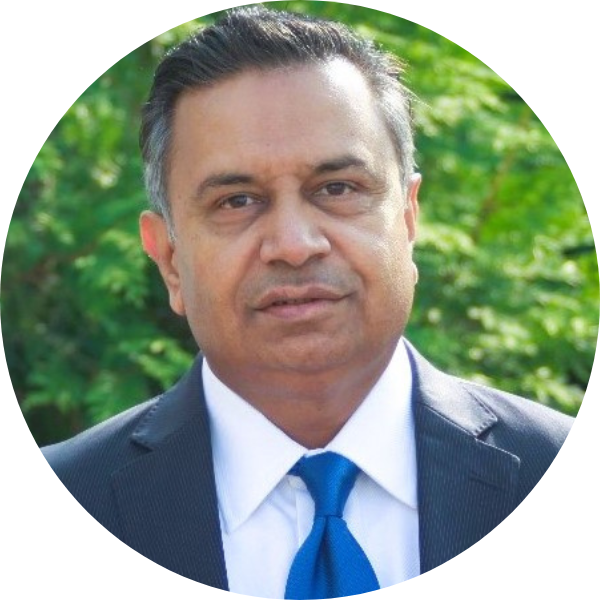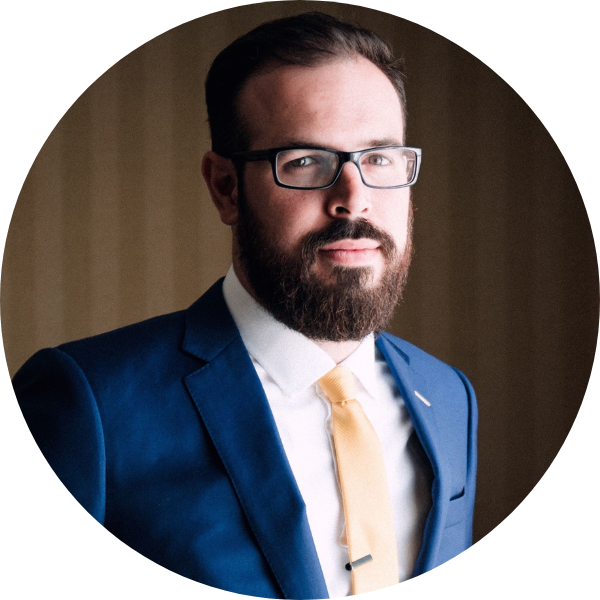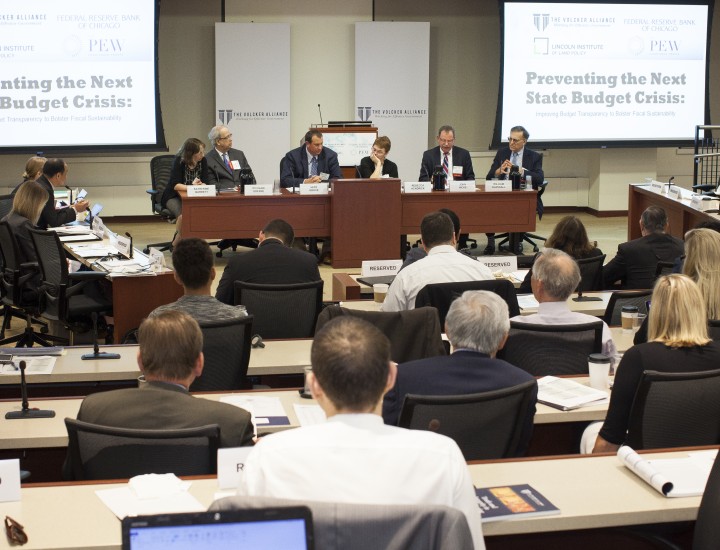Special Briefing: Public Pensions - Still a Crisis?

Many states, counties, and cities emerged from the COVID-19 pandemic and resulting recession with record cash reserves following the US government's injection of $5 trillion to revive the economy and prop up local government budgets. But even after the unprecedented federal support, states and municipalities have been left with more than $1.3 trillion in unfunded liabilities for public employee pension benefits that were promised but are not fully funded. Join our panel of experts as they discuss strategies that state and local governments are adopting to reduce this pension burden and whether they may have to reduce spending for education, infrastructure, and other critical public services to make room for increasing retirement contributions.
Our panel of experts will include Liz Farmer, public finance journalist and co-host of the Public Money podcast; Vedanta Goenka, senior municipal strategist, Citigroup; Merl Hackbart, professor emeritus, Martin School of Public Policy and Administration, University of Kentucky; Shoaib Khan, director, New Jersey Treasury Division of Investment; Anthony Randazzo, executive director, Equable Institute; and Les Richmond, vice president and actuary, Build America Mutual.
Moderated by William Glasgall, Volcker Alliance senior director, public finance and Penn IUR fellow, and Susan Wachter, co-director of Penn IUR, this briefing is the forty-seventh in a series of sixty-minute online conversations featuring experts from the national research networks of the Volcker Alliance and Penn IUR, along with other leading academics, economists, and federal, state, and local leaders.
Special Briefings are made possible by funding from The Century Foundation, the Volcker Alliance, and members of the Penn IUR Advisory Board.
Recordings of the entire Special Briefings series are available on the Volcker Alliance website: SPECIAL BRIEFING SERIES ARCHIVE.
Be sure to subscribe to the Special Briefing podcast, available on Apple Podcasts, Spotify, Google Podcasts, Stitcher, TuneIn, iHeart Radio and more.
Also, be sure to subscribe to the Volcker Alliance newsletter and Penn IUR newsletter.
-----------------------------------------------------------------------------------------------------------------------------------------------------
“A MANAGEABLE CHALLENGE”: MUNICIPAL GOVERNMENT, PUBLIC FINANCE, AND ECONOMIC EXPERTS DISCUSS ONGOING PENSION BURDEN FOR STATE AND LOCAL GOVERNMENTS
Panelists Discussed Unfunded Liabilities for Public Employee Pension Benefits and Their Effects in Latest Volcker Alliance/Penn IUR Briefing
“We have a target of approximately 30% of the [pension] portfolio to alternative asset classes,” said Shoaib Khan, Director of the New Jersey Treasury Division of Investment. “Those targets over the last several years have been increasing, and I think you’ve seen that across several pension plans as well, and it seems to be a trend and a movement towards diversifying portfolios with the inclusion of the various alternative asset classes that are rising.”
“Our top assessment from a 50 state review of data is that funding strategies for public plans have significantly improved whether we look at the last five years or the last 15 years,” said Anthony Randazzo, Executive Director of Equable Institute. “However, the net effect of those strategies has mainly been to prevent, say, a potential funding crisis from developing or getting worse, depending on your point of view. It hasn't significantly moved the needle on funded status, whether we're looking at the national average of funded ratios or unfunded liability levels… The major reasons we think, are related to how the sources of unfunded liabilities are changing and what are the major contributors to what you might notionally call pension debt today. ”
“As far as pension funding is concerned, we have seen a tremendous improvement in ratios since the pandemic,” said Vedanta Goenka, Senior Municipal Strategist, Citigroup. “This improvement has occurred on the back of strong investment returns as well as judicious use of the federal pandemic aid by state and local governments. States like Illinois, New Jersey, and Kentucky that suffer from the worst funded pension programs have seen maximum improvement, and they've benefited not only from these investment returns, but they've also implemented policies that address some of the challenges.”
“The adjustments that state and local governments have made to their pension systems in response to pension system concerns, such as adjusting benefits, supplemental funding, and ensuring contributions are meeting their requirements, has demonstrated a commitment to take actions to ensure the sustainability of pension systems,” said Merl Hackbart, Professor Emeritus, University of Kentucky Martin School of Public Policy and Administration. “Given that demonstrated commitment, it is probably an overstatement to characterize the pension system status currently as being in crisis. Rather, ensuring the viability and sustainability of public pension systems may be best characterized as being a manageable challenge.”
“In answer to the question, ‘Are pensions still in crisis?’ The answer for us is, ‘well, it depends,’” said Les Richmond, Vice President and Actuary, Build America Mutual. “You know, there are some employers, state, local governments that can afford to pay higher pension costs. And we look at those factors; how does this all relate to their overall finances? And can employers pay for these costs? So, you might have neighboring towns that have very similar pension profiles — one is carrying a high amount of debt, one is carrying a little amount of debt — I would say the one with a little amount of debt is in much better shape. So it calls for granular analysis [if] we're going to answer the question if pensions are still in crisis.”
“In a lot of places, [pensions are] still very much an issue, but in terms of the national conversation, pensions have definitely taken a step back. I will note, though, that there are a couple of upcoming things that could add pressure; some of them have already been mentioned regarding the asset investments in alternative assets, that makes pension assets overall more volatile. The stock market itself has been more volatile over the last decade or so. So all of those things are intertwined,” said Liz Farmer, public finance journalist and co-host of the Public Money podcast. “And while that institutional memory of the Great Recession is still very much there in state legislatures, lawmakers have learned their lessons about what not to do with pensions and what not to do with one-time money as well … It's going to be a temptation I expect in the next year or so with regards to [how] those pension payments are eating up some of the annual operating budgets, and as lawmakers are looking to make cuts, it’s always an option.”
-----------------------------------------------------------------------------------------------------------------------------------------------------

Liz Farmer is a fiscal policy expert and journalist, writing for a national audience about the many ways state and local governments spend our taxpayer money. Her areas of expertise include budgets, fiscal distress, tax policy and pensions. She is a regular contributor to Forbes and Route Fifty, and has also been published in the Wall Street Journal, Bloomberg, Chicago Tribune, and other top publications. She is also deeply interested in remote work and is a research fellow at the Rockefeller Institute of Government’s Future of Work Research Center. In addition to writing, Liz’s insight and expertise is a valuable asset in her consulting work with Former GOVERNING publisher and Kansas City Mayor Mark Funkhouser at his firm Funkhouser & Associates.
Liz makes regular appearances on radio and podcast programs and has been a guest on NPR's 1A and CSPAN's Washington Journal. She also speaks and moderates at policy conferences.
Liz honed her public policy expertise at GOVERNING magazine, where her writing was the driving force behind the magazine's educational series, Finance 101, which broke down complicated public money issues in ways that everyone can understand and relate to. She also created the punchy and popular weekly newsletter, The Week in Public Finance.
Liz has previously written for the Daily Record in Baltimore, covering the business of sports and other local industry. She was also a staff writer at the Washington Examiner covering District of Columbia local politics, the region’s economic development and its rapidly changing socio-economic structure.
She received her B.A. from the George Washington University in American history, film and television production. After spending a time traveling and working, she completed her Master of Journalism at the University of Maryland in 2007. A proud native of the San Francisco Bay Area, Liz stubbornly remains a Bay Area sports fan. She and her husband now live in Smithsburg, Md. with their son, where they enjoy farming, growing their own produce and hiking the Appalachian Trail.
 Vedanta Goenka is the lead strategist at the municipal division at Citigroup. In this role, he is responsible for developing macro and sector specific trading strategies by performing macro and fundamental credit analysis. His reports have frequently featured in prestigious media outlets such as WSJ and Bloomberg.
Vedanta Goenka is the lead strategist at the municipal division at Citigroup. In this role, he is responsible for developing macro and sector specific trading strategies by performing macro and fundamental credit analysis. His reports have frequently featured in prestigious media outlets such as WSJ and Bloomberg.
Prior to working in Citi Municipal Research, he has also worked in the FX Sales department and within the Global Economic Research team at Citi. Vedanta has a Bachelor of Arts in Economics and Philosophy from Northwestern University.
 Dr. Merl Hackbart is a professor emeritus at the Martin School and Provost's Distinguished Service Professor of Finance and Public Administration. His research has focused on public financial management including debt management, public pension funds, popular financial reporting and state government structural budget issues. He has previously served as Interim Dean and Associate Dean of the Gatton College of Business and Economics at UK and as a member of the Kentucky Council for Postsecondary Education and the Kentucky Consensus Revenue Forecasting Group. He has also served twice as Budget Director for the Commonwealth of Kentucky and as a Senior Policy Advisor to the Governor of Kentucky. He is a past President of the Association of Budgeting and Financial Management.
Dr. Merl Hackbart is a professor emeritus at the Martin School and Provost's Distinguished Service Professor of Finance and Public Administration. His research has focused on public financial management including debt management, public pension funds, popular financial reporting and state government structural budget issues. He has previously served as Interim Dean and Associate Dean of the Gatton College of Business and Economics at UK and as a member of the Kentucky Council for Postsecondary Education and the Kentucky Consensus Revenue Forecasting Group. He has also served twice as Budget Director for the Commonwealth of Kentucky and as a Senior Policy Advisor to the Governor of Kentucky. He is a past President of the Association of Budgeting and Financial Management.
 As Director and Chief Investment Officer, Shoaib Khan is responsible for the overall operations of the New Jersey Division of Investment with assets of over $120 billion. The Division of Investment is responsible for the investment management of New Jersey’s Pension Fund with asset of approximately $90 billion and supports the retirement plans of over 800,000 members in numerous pension systems. The Division of Investment also manages the State of New Jersey’s Cash Management Fund with asset of approximately $40 billion.
As Director and Chief Investment Officer, Shoaib Khan is responsible for the overall operations of the New Jersey Division of Investment with assets of over $120 billion. The Division of Investment is responsible for the investment management of New Jersey’s Pension Fund with asset of approximately $90 billion and supports the retirement plans of over 800,000 members in numerous pension systems. The Division of Investment also manages the State of New Jersey’s Cash Management Fund with asset of approximately $40 billion.
Mr. Khan joined the Division of Investment in January, 2021 as Deputy Director and Deputy Chief Investment Officer. In June 2021, he assumed the role of Acting Director and in June 2022, was sworn in as Director and Chief Investment Officer. Throughout his career, Mr. Khan has served in numerous senior management positions at both public and private investment institutions domestically and around the globe.
Prior to joining New Jersey Division of Investment, Mr. Khan served as a Senior Portfolio Manager at the Florida State Board of Administration. He has also previously served in the roles of Global Head of Portfolio Management at Union Bancaire Privee (UBP), a Switzerland-based private bank and Strategy Head at J.P. Morgan Alternative Asset Management in New York. Mr. Khan holds a Bachelors of Business Administration from Florida International University and received a Masters of Accounting from Nova Southeastern University. He is a CFA Charterholder and a CPA.
 Anthony Randazzo is executive director of Equable Institute, a bipartisan non-profit that educates and informs employees, labor leaders, and taxpayers about how to create real retirement plan sustainability and accountability without sacrificing future income security. Randazzo has written extensively, through academic articles and analytical reports, on the systemic and political behavioral factors that lead to underfunded retirement systems. And he has worked directly with numerous governments to improve funding policy and build new public sector retirement system designs.
Anthony Randazzo is executive director of Equable Institute, a bipartisan non-profit that educates and informs employees, labor leaders, and taxpayers about how to create real retirement plan sustainability and accountability without sacrificing future income security. Randazzo has written extensively, through academic articles and analytical reports, on the systemic and political behavioral factors that lead to underfunded retirement systems. And he has worked directly with numerous governments to improve funding policy and build new public sector retirement system designs.
 Les Richmond evaluates the credit risks related to pension and other postemployment benefit plans for all of the municipal issuers BAM guarantees – to date more than 5,000 individual borrowers with more than $85 billion par outstanding. His methodology includes creating comparisons between plans using a set of standardized, conservative assumptions. Les also provides support to BAM’s credit committee in developing its underwriting guidelines for analyzing pension risks and responding to emerging issues in the field.
Les Richmond evaluates the credit risks related to pension and other postemployment benefit plans for all of the municipal issuers BAM guarantees – to date more than 5,000 individual borrowers with more than $85 billion par outstanding. His methodology includes creating comparisons between plans using a set of standardized, conservative assumptions. Les also provides support to BAM’s credit committee in developing its underwriting guidelines for analyzing pension risks and responding to emerging issues in the field.
Prior to joining BAM in 2013, Les was with Hay Group, where he was a Senior Principal. Duties included being the Project Leader of a four-year engagement to conduct an actuarial audit of the five New York City Retirement Systems. He also conducted special pension studies for the New York City Office of the Comptroller. Prior to that, he was a Senior Vice President of Aon Consulting, which he joined in 1986, with responsibility for providing actuarial consulting on pensions, post-retirement health and life insurance benefits and executive benefits.
Les is an Associate of the Society of Actuaries and an Enrolled Actuary. He is also a member of the American Academy of Actuaries, Fellow of the Conference of Consulting Actuaries and a member of the American Society of Pension Professionals and Actuaries. He holds a B.A. in Mathematics from Rutgers College. He is a member of the National Federation of Municipal Analysts and the Municipal Analyst Group of New York.


